Experiencing the 2022 WTS International Annual Conference
By Barbara Moreno, Audra Bandy, Brittney Gick, and Shelley Wynne, WTS-DC
May 2022
An important WTS tradition is to send members to experience the WTS Annual Conference. After multiple years of virtual versions, the WTS-DC Chapter was able to send four chapter members to the 2022 WTS Annual Conference in Seattle in person: Barbara Moreno, Audra Bandy, Brittney Gick, and Shelley Wynne. What follows are their key observations, takeaways, and highlights from the WTS Annual Conference.
Barbara Moreno
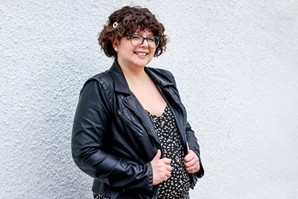
- People need to feel safe in order to use and feel comfortable in a place. During the “Resilient Transit, Resilient Communities” session, it became very apparent that “if you build it, they will come” does not apply universally. A train station in the middle of nowhere will not be used, much less celebrated, without connecting it to people and making people feel connected to it.
- “If I’m not the leader at the right time, then there will be another one.” These words were spoken during the “Exploiting Disruption to Create Resilient Transportation Systems”, and it showed that oftentimes you don’t need to force someone to see your brilliance. Either they will understand and celebrate it, or you will create room in your life for someone else to.
- Reputation and trust change slowly. In the session about the public engagement around the ODOT I-5 highway cover entitled “Leading with Community Values: ODOT's I-5 Rose Quarter Improvement Project”, a recurring theme that resonated with me was that actions speak louder than words. You don’t gain trust overnight in communities that are under-resourced. You have to go in everyday and do the work.
- Remove driving requirements from job postings. Keynote speaker Anna Zivarts gave everyone in the room a simple call to action that could radically transform who is represented at transit jobs nationwide, and I hope many in the room heeded the call.
- Understand what you do well and double down on it. During the USDOT panel, each woman was asked to share one piece of advice for those early in their careers. This one was so obvious, yet one I find frequently missed by many women who try to be superwoman. It’s okay to focus on your strengths. You don’t need to be perfect.
Audra Bandy
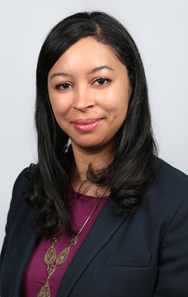
- Go first and show the way. Ximena Spicer, the facilitator of the Emotional Intelligence and Unconscious Bias professional development workshop, shared that leaders who acknowledge their vulnerability to bias encourage others and set the tone for growth. This starts at the top of the organization and must be followed by other leaders within the group.
- Take care of others, but if you are not being respected and valued, then find an organization that will. Throughout the conference, I spoke with many women who made (or were planning to make) decisions that would positively impact their mental and physical health because over the last two years they realized the value they held, even when others did not.
- Don’t confuse activity for achievement. This advice was shared by keynote speaker Susan O’Malley and is important for everyone to remember. Making measurable goals can be challenging and is a skill that we can all work on.
- What is safe for you may not be safe for others. The biggest technical “ah ha” moment I had was during the closing session with keynote speaker Anna Zivarts. She described how roundabouts can be a safe alternative for many road users, but for someone who is visually impaired or blind, navigating them can be a major challenge. For example, if you are navigating a road crossing by listening for a pause in vehicle noise to indicate an opportunity to cross, a roundabout may not provide that because the vehicles never stop. I have been working on roundabouts and safe systems for many years and never thought about them from that perspective. Very powerful.
- The power of being yourself. I was able to meet many interesting, passionate, exceptional people because they showed up as themselves. Sometimes it was the comment they made, the question they asked, or the way they physically presented themselves, but they all led to conversations that I truly valued and left me feeling even more connected.
Brittney Gick
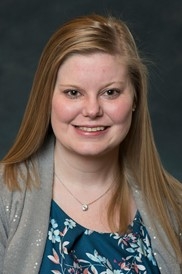
King County Metro Zero Emissions Fleet and Facilities Tour. The King County Metro-led tour allowed WTS Annual Conference attendees to see the zero emission fleet up close. Attendees learned about the steps that King County Metro has taken to build their zero emission fleet and facilities, including the operational needs for expansion and charging infrastructure. King County Metro has been an early adopter of battery electric buses and trolleys with a goal of becoming a 100% zero emission fleet by 2035. King County Metro currently has 185 zero emission buses.
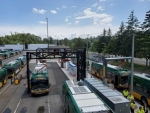
Keynote Speaker: Susan O’Malley. WTS Annual Conference attendees laughed along with Susan O’Malley in the opening day keynote address as she shared the sage advice that she has collected over the years. Susan O’Malley was the first female president of a professional sports team - the Washington Bullets (now the Wizards). It was an honor to be able to hear straight from Susan about her experiences in a male-dominated profession. One valuable piece of advice that Susan shared was to make your bed every morning because if you can’t do the small things right, how can you do the big things right? She also shared her insights on building a brand up and promoting customer service by reaching out to customers to get feedback and to solve problems, even if they may be small ones.
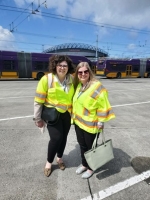
USDOT Conversation. WTS Annual Conference attendees spent time hearing about agency updates and priorities from USDOT leadership, including Nuria Fernandez (FTA), Robin Hutcheson (FMCSA), and Jennifer Mitchell (FRA). It was insightful to hear straight from DOT leadership about how they got to where they are and what is currently going on in their agencies.
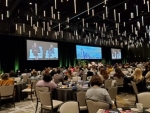
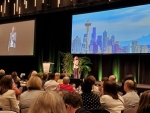
Equity Statements in Motion: Findings from the 2022 California Transportation Equity Listening Sessions. During this panel, attendees heard about the successes and challenges faced from the statewide Transportation Equity Listening Sessions, which were led by the California State Transportation Agency (CalSTA), the California Transportation Commission (CTC), and the California Department of Transportation (Caltrans). The purpose of the listening sessions was learn about the impacts of the transportation system on individuals and the communities in which they live by getting actual feedback from community members themselves. It was interesting to hear from the panelists representing the three agencies, including Avital Barnea, WTS-DC Chapter Advisor, on the effort it took to bring community members to the table in order to improve equity across California.
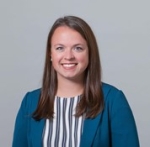
Shelley Wynne
WSDOT State-Route 99 Tunnel Operations Center Tour. The WSDOT State-Route 99 Tunnel Operations Center tour was a WSDOT-led tour with other fellow WTS Annual Conference attendees. The tour provided a broad overview of the operation of the tunnel including viewing the operation control room and how it integrates with the Traffic Management Center (TMC). One of my favorite parts of the tour was learning about the tunnel boring machine “Bertha” that began digging the SR 99 tunnel in 2013 and completed her dig in 2017.
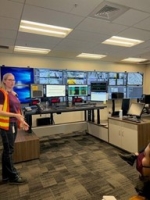
Taking the Leap to Public Service. This session, titled ‘Taking the Leap to Public Service’, featured discussions on the transition to working in public service with Jennifer Mitchell (FRA), Audrea Olson (UDOT), Christopher Martinovich (Carson Public Works & Carson Area Metropolitan Planning Organization), and our very own WTS-DC Immediate Past President Neela Babu (WMATA). The session featured a variety of questions focused on the differences and challenges that come with working in the public sector and with the public on a more frequent basis.
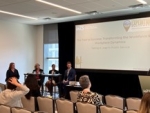
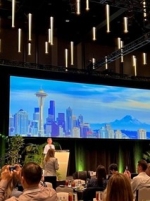
Lunch & Keynote Session: When Driving Isn't An Option: Building A More Equitable Transportation System with Anna Zivarts, Director, Disability Rights Washington. The keynote session with Anna Zivarts was eye-opening and informative. Anna Zivarts was born with nystagmus which is a genetic condition that means her eyes are always shaking. This reduces her visual acuity and therefore she cannot drive. Anna’s presentation focused on access to transportation for those who can't drive or don't have access to a car. Anna shared personal stories of individuals who rely on public transportation and multi-modal facilities for their commute. We currently live in a world that is set up and designed for cars and sometimes we forget that not everyone drives. The stories she shared reflect the experiences of nearly a quarter of the Washington State population that doesn't have a driver’s license. The Disability Mobility Initiative wants to raise awareness about how people without access to cars navigate to essential services in our communities.